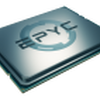AMD announces the addition of two processors to the 2nd Gen AMD EPYC stack. The AMD EPYC 7662, the fifth 64-core EPYC processor, and the AMD EPYC 7532 a 32-core processor with a total of 256MB of L3 cache.
These new processors are currently available on the Dell EMC PowerEdge R6515, R7515, R6525, R7525 and C6525 servers, as well as Supermicro A+ servers, except for the “Big Twin.”
Today, we’re now adding our fifth 64 core processor to the 2nd Gen EPYC stack with the AMD EPYC 7662. This processor is a great entry point into the 64-core market, providing customers access to the same high-performance ‘Zen 2’ cores as one of the world’s fastest x86 server processors with the AMD EPYC 7H1], but at a lower cost point compared to other mainstream AMD EPYC 64 core processors. The other new addition, the AMD EPYC 7532, provides customers with a high performance, 32 core processor with a total of 256MB of L3 cache, the same amount as the 2nd Gen EPYC 64 core processors. The AMD EPYC 7532 is great for cache sensitive workloads, like ANSYS CFX, giving each core access up to 8MB of L3 cache. On average across all ANSYS CFX benchmarks, the AMD EPYC 7532 has 111% better performance compared to the Intel Xeon 6248.
These two processors still have all the features of the 2nd Gen AMD EPYC processor family including 128 lanes of PCIe 4.0, support for up to 3200MHz memory and advanced security features. Dell Technologies and Supermicro will be the first partners to support these two new processors. Both processors are available now on the Dell EMC PowerEdge R6515, R7515, R6525, R7525 and C6525 servers. Both processors are also available now on all Supermicro A+ servers, while the Supermicro “Big Twin” server supports the AMD EPYC 7532. HPE and Lenovo are expected to support these two new AMD EPYC processors in the coming months. Learn more the new processors here and see product details below.
|
Model |
Default TDP (W) |
Cores |
Threads |
Base Frequency (GHz) |
Max. Boost Frequency (GHz) |
L3 $ (MB) |
|
7662 |
225W |
64 |
128 |
2.0Ghz |
Up to 3.3Ghz |
256MB |
|
7532 |
200W |
32 |
64 |
2.4Ghz |
Up to 3.3Ghz |
256MB |

